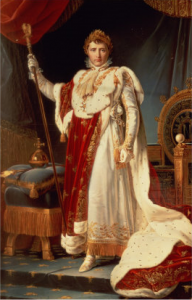Good morning, Whitewater.
Tuesday in town will be partly cloudy with a high of thirty-two. Sunrise is 7:07 AM and sunset 4:21 PM, for 9h 13m 51s of daytime. The moon is a waxing gibbous with 82.2% of its visible disk illuminated.
We’ve a series of public meetings in the city today. At 6 PM, the Planning Commission will meet, at 6:10 PM the Alcohol and Licensing Commission meets, and at 6:30 PM Common Council meets in joint session with the Planning Commission.
On this day in 1804, France gets what no one needs, an emperor:
The coronation of Napoleon as Emperor of the French, which took place on Sunday December 2, 1804 (11 Frimaire, Year XIII according to the French Republican Calendar), at Notre Dame Cathedral in Paris, has been said to mark “the instantiation of modern empire”, representing a “transparently masterminded piece of modern propaganda”.[1] On May 18, 1804, the Sénat conservateur vested the Republican government in an Emperor, and preparations for a coronation followed. Napoleon’s elevation to Emperor was overwhelmingly approved by the French citizens in a referendum. Among Napoleon’s motivations for being crowned were to gain prestige in international royalist and Catholic milieux and to lay the foundation for a future dynasty.[2]:243
In the classical French tradition, kings underwent a ceremony of consecration (sacre) rather than a coronation; in consecration, anointment was conferred by the archbishop of Reims in Notre-Dame de Reims.[2] Napoleon blended Roman imperial pageantry with the purported memory of Charlemagne. The coronation was held in Paris in the presence of Pope Pius VII. According to government tallies, the entire cost was over 8.5 million francs…..
In Wisconsin history, a Wisconsin’s U.S. Senator Joseph McCarthy is disgraced:
After two months of hearings and deliberations, the Watkins Committee recommended that McCarthy be censured on two of the 46 counts: his contempt of the Subcommittee on Rules and Administration, which had called him to testify in 1951 and 1952, and his abuse of General Zwicker in 1954. The Zwicker count was dropped by the full Senate on the grounds that McCarthy’s conduct was arguably “induced” by Zwicker’s own behavior. In place of this count, a new one was drafted regarding McCarthy’s statements about the Watkins Committee itself.[110]
The two counts on which the Senate ultimately voted were:
That McCarthy had “failed to cooperate with the Subcommittee on Rules and Administration”, and “repeatedly abused the members who were trying to carry out assigned duties …” That McCarthy had charged “three members of the [Watkins] Select Committee with ‘deliberate deception’ and ‘fraud’ … that the special Senate session … was a ‘lynch party'”, and had characterized the committee “as the ‘unwitting handmaiden’, ‘involuntary agent’ and ‘attorneys in fact’ of the Communist Party”, and had “acted contrary to senatorial ethics and tended to bring the Senate into dishonor and disrepute, to obstruct the constitutional processes of the Senate, and to impair its dignity”.[111] On December 2, 1954, the Senate voted to “condemn” McCarthy on both counts by a vote of 67 to 22.[112] The Democrats present unanimously favored condemnation and the Republicans were split evenly. The only senator not on record was John F. Kennedy, who was hospitalized for back surgery; Kennedy never indicated how he would have voted.[113] Immediately after the vote, Senator H. Styles Bridges, a McCarthy supporter, argued that the resolution was “not a censure resolution” because the word “condemn” rather than “censure” was used in the final draft. The word “censure” was then removed from the title of the resolution, though it is generally regarded and referred to as a censure of McCarthy, both by historians[114] and in Senate documents.[115] McCarthy himself said, “I wouldn’t exactly call it a vote of confidence.” He added, “I don’t feel I’ve been lynched.”[116]
Google-a-Day poses a sports question:
The longest tennis match in history was played over three days and included how many strokes by the American born player?

